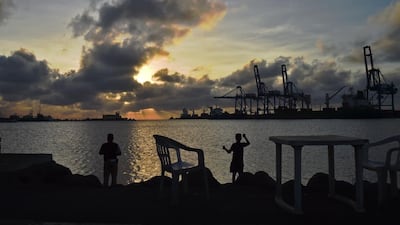DJIBOUTI // This small east African nation does not have resources in the traditional sense. It has no proven oil reserves, its desert climate is too harsh to grow anything and its population too small to drive industry. Instead, Djibouti’s asset is its location.
Perched on the narrow Bab Al Mandeb Strait that connects the Gulf of Aden to the Red Sea, Djibouti sits along one of the world’s busiest waterways and at a formidable natural chokepoint where Africa comes within just 32 kilometres of the Arabian Peninsula.
Djibouti’s position has gained the attention of foreign powers, who now vie for economic and military edges in this often forgotten corner of the world.
Sitting between restrictive Eritrea and war-plagued Somalia, Djibouti has emerged as the only safe, efficient port in a troubled Horn of Africa. This distinction has allowed Djibouti to serve its landlocked neighbour Ethiopia, the continent’s second-largest country with more than 90 million people.
Djibouti is now a safe harbour where ships can resupply, crews rest up, and mercenaries can board vessels they will be protecting on the once perilous journey past Somalia. A host of logistics, shipping and trading companies have set up shop.
Its ports went from handling 160,000 containers per year in 2004 to 830,000 containers last year, according to the Djibouti ports and free zones authority.
The strategic location of Djibouti has not escaped military minds either.
Since 2001, the US has used Camp Lemonnier, a former French Foreign Legion outpost attached to the Djibouti’s international airport, to drive campaigns in Somalia and Yemen. The base is the only US military installation in Africa and has been a cornerstone of Washington’s controversial drone programme.
Last year, the US renewed the lease on the camp for 20 years, promising Djibouti $70 million (Dh257m) a year in rent – about double what it was paying before. The US is in the process of expanding the base and plans to spend $1.4 billion upgrading the facility over the next two decades.
In recent years, when the Russians approached Djibouti about opening a base they were turned away by officials citing a potential conflict of interest.
With Djibouti also hosting French and Japanese facilities, it seems to be allowing only the US and its allies to have a military presence.
But that policy might be changing.
In May, president Ismail Omar Guelleh announced that Djibouti was in talks with Beijing about opening a Chinese military base in the country, a move that he said would be welcomed.
While other countries have sought to use Djibouti only to project their military power in this important corner of the world, China has invested billions of dollars in the country’s infrastructure – a factor that may have swayed Djibouti to allow them to operate a base here.
China is bankrolling the construction of a new port in Djibouti and two new airports. Two state-run Chinese companies are building a rail link between the Ethiopian and Djiboutian capitals that is being financed by a state-run Chinese bank and the Ethiopian government.
More than $14bn worth of infrastructure projects are currently being developed in Djibouti in the coming years, with the majority of the capital coming from China.
The UAE has shown interest in Djibouti as well, with DP World opening the Doraleh container terminal – a large port just south of the capital – in 2008.
It is still running the terminal despite a current legal dispute between Djibouti and the Dubai company over the awarding of the initial contract, the country's finance and economy minister told The National in March.
The boom in investment has raised hopes that the tiny country might be able to become the next Dubai or Singapore – two other small city-states positioned on important waterways that, despite limited resources, have used their location to become economic powerhouses.
In government offices in Djibouti, artistic renditions on calendars depict an airport in the remote north of the country with jets from Lufthansa, FlyDubai and Emirates sitting on the tarmac. Another portrays a new seaside enclave in Djibouti that will replace the capital’s old port and boast a yacht club, luxury villas, a cruise terminal, shopping malls and hotels.
The ports and free zones authority says the construction of a new free-trade zone in Djibouti could create 200,000 jobs.
But those visions are still a very long way from where Djibouti is today.
So far, the billions invested in the country have yet to trickle down to the street.
Roughly 60 per cent of Djiboutians remain unemployed and illiteracy is high. Roads in the capital, apart from some main streets and the areas around the ports and foreign military bases, are rough and slow going. In the afternoons, the capital more or less shuts down as the majority of men start chewing the narcotic qat.
foreign.desk@thenational.ae

